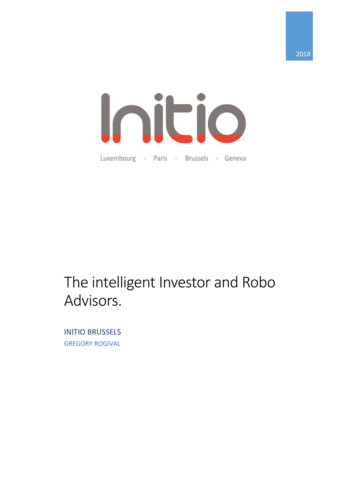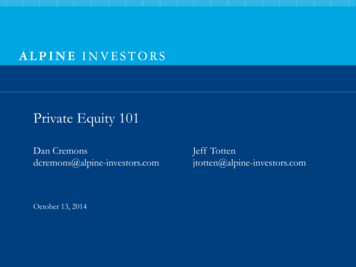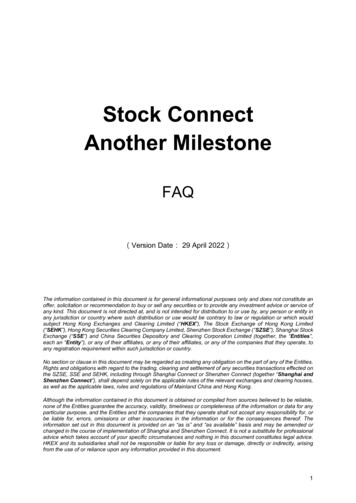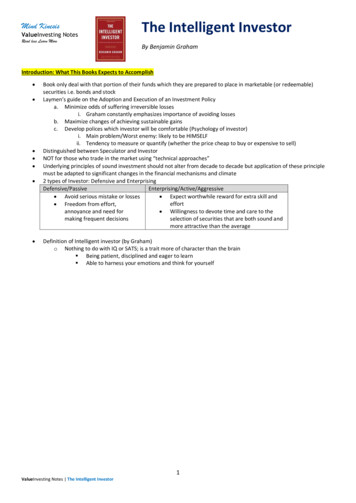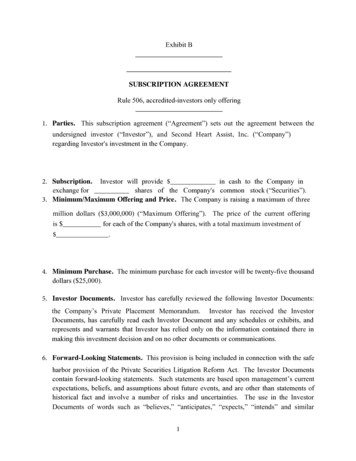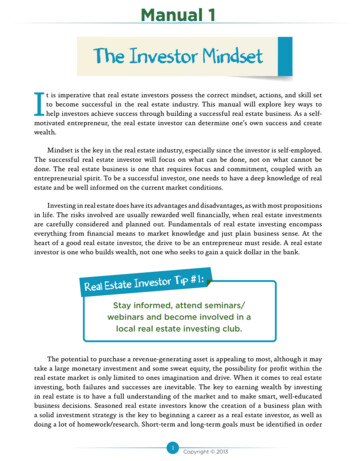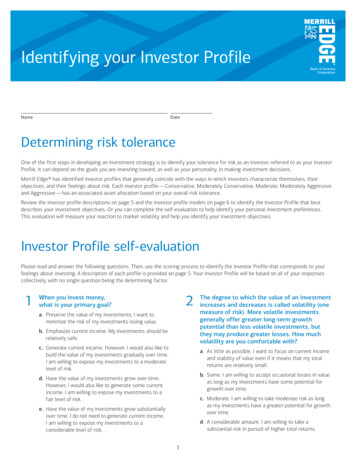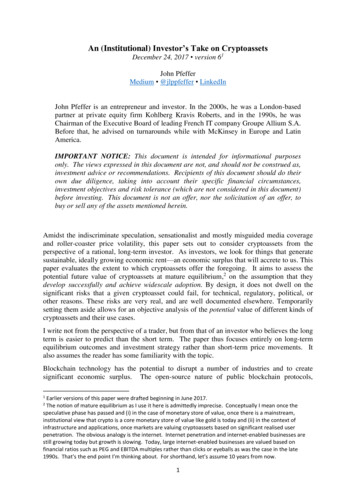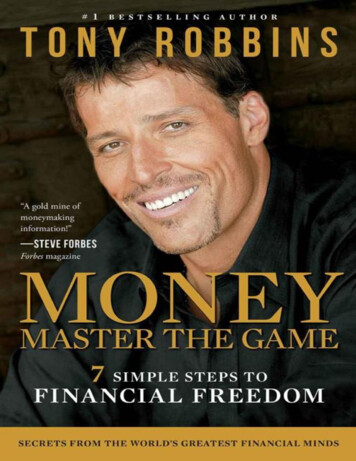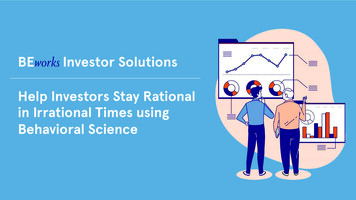
Transcription
BEworks Investor SolutionsHelp Investors Stay Rationalin Irrational Times usingBehavioral Science1
How can we preserve rationality in our ranks, andjust as critically, amongst investors, in these tryingtimes? Understanding the commonerrors made both by institutionaland individual investors whenvolatility reigns can come throughunderstanding the science ofhuman behavior.How Investors Can Stay Rational in Irrational Times by David Lewis, Kelly Peters, andDan Ariely Published March 31, 20202
The Challenge for InvestorsMarket anxiety is leading investors to make predictablyirrational decisions History tells us that many investors panic andliquidate, realize losses, and miss the recovery Other investors may think they can “time themarket” to sell at the peak and buy low, but thereis ample evidence that this is unlikely to happen 87% of investors either do not have an advisor orthey ignore some or all of the advice We know empirically that financial advisors helpclients achieve better outcomes How can we help investors listen to expert advice?3
We know that people donot act as rational agentsUnderstanding the mindsetof investors during thispandemic, and how thatcan exacerbate existingbiases, is critical to helpingthem make betterinvestment decisions.BehavioralEconomics providesactionable insightsinto how investorsmake decisions4
The Business Case for BehaviorallyInformed Investing and AdviceWe are in the midst of the economic fallout caused by a global pandemic;these uncertain times can lead to sub-optimal behaviors for investors.BEworksInvestorSolutions aredesigned to:12Help institutions improve their communications withinvestors to avoid the traps of emotional decision-makingand have better long-term outcomesTrain Investment Advisors to understand and overcomethe biases impacting investors5
Investor Communications AuditEnhance your end-to-end communications to clientsusing Behavioral ScienceThere is no neutral presentation,only unconsidered presentationInvestors needcommunications that:Re-design your communications witha BE lens including everything from:§Keeps things simple§§Mitigate the effect of anxiety§Mitigate the effects ofscarcity mindset§Nudge to overcome ital Investment PlatformOptimizationAdvisor ScriptsCall centre scriptsAnd much much more6
Current communications may fallshort because investors Are anxious — causing reducedattentional control, elevated threatdetection, negativity, and increasedrisk aversionAre in a scarcity mindset— causing attentional shift to presentneeds, reduced cognitive ability, focuson opportunity costs over benefits, andheightened self-interestThis leads them to Have difficultyprocessing financialadvice because it is toocognitively demanding Attend to and processinformation that is relatedto present needs ratherthan future goals Become more focused onrisks and possible lossesthan gains Feel an urgency to liquidateassets to survive ‘now’7
A Sample of the Biases that Affect Investment DecisionsLoss Aversion BiasPeople feel marketlosses as 2x more painful thanequivalent market gainsIllusion of Control BiasPeople believe they have control overrandom events or events over whichthey are powerlessConfirmation BiasPeople interpret newinformation in a waythat is consistent withtheir existing opinionRepresentativeness BiasPeople believe that currentconditions will persist unchangedinto the futureDecoy EffectsPeople often change theirpreference between existing optionswhen a new option is added8
The Investor Communications AuditOvercome CognitiveLimitations:Increase Memorabilityand UnderstandingOvercome ScarcityMindset:Reduce Present BiasOvercome Anxiety:1 23 4Reduce Fixation onNegative StimuliAddress CommonBiases:Reframing information9
Our OfferingInvestor Communications AuditApplying behavioral science to enhance communicationsCommunications FrameworkEvidence-based recommendations that limit emotional decisionmaking and drive better investor outcomesThe InvestorCommunicationsAuditBE Informed ScriptsScripting for Advisors and Staff that will enhance outcomesDigital Platform OptimizationExamine messaging and navigation through a BE lensExecutive DebriefRoundtable discussion on BE insights for the current environment10
Sample Communication AuditWe diagnosed barriers across the psychological journeyATTENDPERCEIVEDECIDEACTInformation OverloadThere is too muchinformation here.Perceived Hassle CostsThis is going to be a lot of work.AnchoringI’ll base my response onthe context – anxiety andscarcitiy mindsetStatus Quo BiasWhy should I change what I’malready doing (or not doing)?Lack of SaliencyWhat information is mostimportant?Low Perceived CredibilityWhy should you be my choicein 2020?Lack of Goal-FramingHow does this relate to menow, and in the future?ProcrastinationI’ll do it another time.Lack of Brand AwarenessWho are you?Lack of ProgressI feel like I’m behind, orthat my effort so far hasn’tbeen enough.Choice OverloadThere's too manychoices.What if I choosewrong?Uncertainty and AnxietyThis makes me uncomfortable,I can’t do this now.Lack of TangibilityI can’t picture myself using this.Processing DisfluencyThis feels hard, so I don’tthink I can trust this.Hassle CostsThere are a lot of steps tothis process.Lack of Reference PointI don’t know where to start.Low Perceived ValueI don’t see the value ofinvesting with you.11
Example Communication AuditWe developed tactics to address these barriersBE Tactic 1Competitor ComparisonBE Tactic 2PersonalizationBE Tactic 3Future Goal-FramingBE Tactic 4Enhanced Active Choice12
“These biases end up leading us to sell our portfolios inthe face of downturns, to feel like we are taking actionagainst volatility.Behavioral economics not only pinpoints these biases, butit also provides directions for how to overcome them.”- David Lewis, Kelly Peters, and Dan ArielyThe Globe and Mail, March 31, 202013
About BEworks14
Our HistoryFounded in 2010, BEworks is the world's first commercialconsulting team dedicated to the application of BehavioralEconomics to real-world challenges.The company’s co-founders are renowned behavioral experts.Kelly PetersCo-Founder & CEODan ArielyCo-Founder & ChiefBehavioral ScientistNina MažarCo-Founder & ChiefScientific AdvisorOur leadership team brings unparalleled expertise to your organization15
Our PeopleWe have approximately 60 people on ourteam, serving clients around the worldTorontoLondonCanadaUKWe are a PhD powerhouse – Our teamholds advanced degrees in behavioralscience, psychology, marketing,economics, finance, and decision scienceNew YorkBogotáUSAColombiaOur associates are scientistswho understand how to tacklereal-world challengesTokyoNairobiJapanKenyaA calibre like none other16
Some of Our Subject Matter ExpertsKelly Peters, MBACo-Founder & CEO, BEworksKelly is the Chief Executive and Co-Founder of BEworks. Sheworks with CEOs and board members to help them tackle theirbiggest challenges with BE. Prior to launching BEworks, Kellyhas 20 years focused on business and technology innovation.She has held senior positions at the Royal Bank of Canada andthe Bank of Montreal.David Lewis, PhD, MBA, CFAChief Client Officer, BEworksDavid advises senior leaders on the impact of BE on theirbusiness challenges. David has held numerous senior positionsincluding President, CEO, and Chairman of the Board, atglobal financial institutions including Barclays Wealth USA, UBSBank USA, UBS Financial Services Americas, ING DIRECT USA,and Bank of Nova Scotia.Dan Ariely, PhDCo-Founder & Chief Behavioral Scientist, BEworksDan is the James B Duke Professor of Behavioral Economics atDuke University and co-founder of BEworks. He is considered aworld expert on financial decision-making and has authoredseveral NYT best-selling books on the topic, includingPredictably Irrational, The Upside of Irrationality, and Dollars andSense.Max Thomson, MBA, CFAExecutive Advisor, Financial Services, BEworksAt BEworks, Max uses his expertise and experiencein collaborating with financial institutions to understand theirchallenges and articulate how BE infused strategies cancomplement core underlying strategies. He has spent 20 yearswith Royal Bank of Canada and is a subject matter expert in RetailBanking and Wealth Management.17
THANK YOUContact Us:David LewisMax Thomsoninfo@BEworks.comChief Client OfficerExecutive Advisor, s.comToronto NYC Bogotá Tokyo London18
How Investors Can Stay Rational in Irrational Times by David Lewis, Kelly Peters, and Dan Ariely Published March 31, 2020. 3 The Challenge for Investors Market anxiety is leading investors to make predictably irrational decisions History tells us that many investors panic and liquidate, realize losses, and miss the recovery
